written by Laurie Tom
Unlike summer on American TV, new anime debuts year round with every season, and this summer in particular looks like fun times, with multiple shows I’m interested in following. It’s like winter 2015 all over again, where there’s more than I can keep up with, but this time there are no returning series vying for my attention and all of the interesting things are new.
It’s going to be hard to limit my viewing pool to my preferred cap of three shows! There is one exception though, due to a very special bonus show I’m including at the bottom.
Aoharu x Machinegun

Why I Watched It: Cross-dressing girl ends up entering a survival game where it’s assumed that she’s male. I like the character designs and I’m fond of genderblender characters in anime. Hotaru’s same design could be a male character voiced by the same actress in a different anime and actually be male due to the fact teenage boys are frequently voiced by women, so it’s extremely easy to buy into her ability pass.
What I Thought: Hotaru is a hot-blooded class president who for reasons unknown, prefers dresses in the male school uniform. Most people who don’t know her assume she’s male. This is even more obvious in Japanese where her word choices indicate a very masculine speaker. She also shouts a lot and is willing to beat up people for social infractions, which makes her pretty fun to watch. It turns out she’s really good at reading people in a fight, so when a misunderstanding leads to her wrecking a host club she gets press-ganged onto a survival game team to pay off the debt.
Verdict: I’d like to watch, but this season is pretty crowded with good stuff. Hotaru’s short fuse is a bit much, but I like that (so far) she just seems to be a girl who likes to wear the male uniform and there’s no tragic backstory to it, and her personality is not one that girls are frequently allowed to have as a starring protagonist. I’m a bit disappointed though that the survival game appears to be paintball or airsoft as I thought it was going to be a more literal survival.
Where to find stream: Crunchyroll
Charlotte
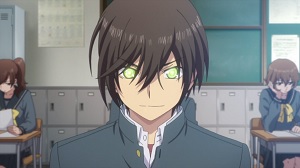
Why I Watched It: The latest series from the writer and character designer behind Angel Beats. Writer Jun Maeda is known for pulling on the heartstrings so there will probably be a lot of light-hearted moments before ultimately delving into a tissue box at the finale.
What I Thought: I usually don’t like jerk protagonists, but Yu is the creative kind. In middle school he discovers that he can possess other people for 5 seconds while his own body falls comatose, and as expected for his age, he decides to use his power to get back at other people and also to cheat his way into an elite high school by temporarily possessing other students who are smarter than him so he can read their answers while taking exams. He might not be book learned, but he’s definitely clever and incredibly manipulative. His shenanigans catch up with him though and he is forcibly transferred to another school that is intended for people with powers like him, where he presumably will turn out to be a better person by the end.
Verdict: I’ll be watching. Given the series’ pedigree and the similarly stunted powers the other students have (being invisible to only one person at a time, superspeed without the ability to slow down equally fast) it looks interesting.
Where to find stream: Crunchyroll
GATE

Why I Watched It: A generic-looking medieval fantasy world invades modern day Tokyo and Japan needs to fight back. Normally I wouldn’t be watching, but the protagonist is a 33-year-old fanboy who also serves in the Japanese Self Defense Force, and getting a thirty-something protagonist in an anime is pretty rare!
What I Thought: In some ways better than expected. I like that it’s an anime that actually includes the appropriate military response when invaded by another dimension and an appropriate timeline for Japan to send invasion forces of their own in reply. On the other, it looks like the thirty-something fanboy soldier is going to gain a trio of teenage fantasy world inhabitants for traveling companions and they’re all girls. That’s going to look creepy. He’s not the only one sent through the gate though so it looks like we’ll get to see a modern army vs. a medieval fantasy army.
Verdict: Going to pass. Looks like it has the potential to be fun, but there’s more than enough going on this season to keep me occupied.
Where to find stream: Crunchyroll
Monster Musume

Why I Watched It: I was not going to watch this one on account of it being a harem show (one male character surrounded by multiple love interests vying for his affection), but I had heard from other women who had watched it that it’s unusual for its kind, and not just because all the girls are monsters.
What I Thought: It’s a raunchy romantic comedy with an unfortunate put-upon human male who, no matter what, must avoid having sex with his hot female lamia housemate who was unexpectedly assigned to him as part of a species exchange program (otherwise she will be deported and he’ll be arrested). She doesn’t take the threat seriously though, and really, really likes him. Monster Musume asks questions like, how does a lady who is half snake use a toilet and does she wear underwear? It was surprisingly funny and I felt a little sorry for protagonist Kimihito because Miia is a constrictor so she kinda likes crushing him in her affectionate coils.
Verdict: It’s funny, but I’ll pass. I’m sure the tone of the story will change when more monster girls are introduced, and there will be the usual lack of relationship progress to keep open the possibility that Kimihito could end up with any of them (next episode promises a centaur and a harpy), but it’s a cut above the usual for it’s kind.
Where to find stream: Crunchyroll
Overlord
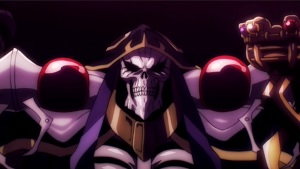
Why I Watched It: This was a moth towards the flame sort of attraction. Though I’m tired of stories where people find themselves living inside of a video game or a video game-like world, this one twists a little differently in that there’s only one person left in the game and he’s not your typical hero-type.
What I Thought: Overlord surprised me with its first scene past the opening credits. Guild leader Momonga’s sadness over the shutdown of his favorite MMO and memories of all the good times shared with his guild are instantly relatable to anyone who has gone through something similar. I also didn’t expect that Momonga would be a working adult in his real life (that we don’t see). Given his weariness towards his day job, it’s not entirely surprising when he wonders if he would want to leave this new reality he’s in, supposing he could even find a way out now that the game controls and any ability to contact the GMs have disappeared. Momonga was previously a max level player and in charge of a massive fortress (built collectively by his guild), and now that all the NPCs have come to life, he has a small army of monsters at his command. They treat him like an overlord, but he’s not really. He just plays one.
Verdict: I’d like to find some time for this, at least long enough to see where it’s going. I particularly like the disconnect between Momonga’s internal thoughts, rendered in a normal voice, and his external ones, which are voiced like you would expect from a skeleton lord. He’s very concerned about staying in character in front of his underlings.
Where to find stream: Funimation and Hulu
Ranpo Kitan: Game of Laplace

Why I Watched It: Ranpo Edogawa is one of the classic mystery writers of Japan. 2015 is the 50th anniversary of his death and in honor of that, Ranpo Kitan: Game of Laplace is a series inspired by his body of work, which is still read today.
What I Thought: The first episode is based on one of Edogawa’s stories, “The Human Chair,” that will likely end up as grisly as it sounds. Middle school student Kobayashi is an unusual POV character and I’m not even sure he’s intended to be the main character. He wakes up holding the weapon responsible for his homeroom teacher’s murder with no memory of the crime or even how he got into the classroom where it happened. He’s oddly plucky for someone accused of murder, and readily accepts the challenge set by irritable teen detective Akechi (based on Edogawa’s most famous detective character, who was not a teen in the original) to clear his name and catch the real criminal.
Verdict: I’ll be watching. I love a good mystery, and while Kobayashi doesn’t do anything for me, I’m really interested in Akechi who seems to have some malady that requires him to regularly take painkillers. Akechi might be a detective, with special dispensation from the government to work as one on account of his age, but he’s clearly willing to bend his commitment if it suits him.
Where to find stream: Funimation and Hulu
Rokka: Braves of the Six Flowers

Why I Watched It: Pleasing art style and I read that the premise involves a slight problem in that the Goddess of Fate had chosen six heroes to save the world, but seven people have answered the call.
What I Thought: The Mesoamerican setting is unfortunately just superficial window dressing as everyone’s names feel more at home in the Old World, and the costuming of the main characters, judging by the opening credits, follows typical anime conventions in that they dress however they want and Mesoamerica is not what I would have guessed. Adlet Mayer’s interruption of the holy ceremony at the start of the show feels especially egregious in that you have a pale person with a European-style name ruining the local ceremony run by brown people (not to save a life, but because he wants to be the chosen one), and he’s the hero. It probably doesn’t play out with the same racial implications in Japan, but as a PoC in America it’s rather cringy.
Verdict: Going to pass. I don’t like Adlet, or the hare-brained princess who’s taken a shine to him. If the Mesoamerican setting was more involved I’d be inclined to give it another shot, but since they’ve left the city at the end of the episode I think it’s going to look more like a generic fantasy from here on out.
Where to find stream: Crunchyroll
Snow White with the Red Hair

Why I Watched It: Not based on the Snow White of European fairy tales. This Snow White is a healer with unusual red hair, caught between two suitors with nary an evil queen in sight. Clearly looks like a romance/adventure story.
What I Thought: When Prince Raj requests Shirayuki (literally translates into “Snow White”) for his concubine, she doesn’t meekly give in. Shirayuki runs away to the kingdom’s border and through luck meets up with a young man named Zen and his companions. The show plays on the fairy tale a bit with poisoned apples showing up to show Shirayuki that she hasn’t escaped Prince Raj’s notice, and Raj is the one who asks a “mirror” about the fairest in the kingdom, but otherwise the story doesn’t care much about the original. While I like the chemistry between Zen and Shirayuki as romantic leads, I dislike that the climax of the episode still relies on Zen saving Shirayuki from Raj. It’s a good play on Zen’s part that hinges on the reveal he’s also a prince of a neighboring kingdom, but I wish that Shirayuki had been able to get out of the problem herself.
Verdict: I’d like to watch, but I’m probably going to wait due to the other shows this season. As far as fantasy romance goes though, this looks like a good bet.
Where to find stream: Funimation and Hulu
Ushio and Tora

Why I Watched It: Ushio and Tora was one of the first anime I watched, and was the very first manga I ever bought, even though it was in Japanese. It’s a buddy adventure story between a middle school kid and the demon who wants to kill him (seriously!). Since the first anime was only a direct to video release of some of the early story arcs and the manga went untranslated I was disappointed that I never got to experience the whole thing. That’s changed now!
What I Thought: The opening plays out a little differently from what I remember back in the 90s, but doesn’t deviate from familiar territory with the same antagonistic dynamic that will eventually become a budding friendship between the human Ushio and the demon Tora that makes the series what it is. It covers how Tora got impaled with the Beast Spear and offers a compelling reason for just why Ushio would free a human-eating demon. No effort has been made to update the art style, making it look a little dated, but it has all the story bits in the right places and Ushio’s brash personality is one that we rarely have in protagonists these days.
Verdict: I will be watching! Definitely looking forward to more adventures with these two. The show plans for an eventual 39 episodes broken into two parts, and they’re going to cover the entire manga!
Where to find stream: Crunchyroll
Bonus!
The following is not an anime, but is based on a popular manga, and thus likely to be of interest to anime viewers. Other people might have heard of this series but just can’t get into watching animation or reading comic books, in which case, this is also for them.
Death Note

Why I Watched It: Death Note has been one of the most popular series in recent years, featuring a protagonist who discovers a supernatural notebook that allows him to kill people by writing their name in it. The original manga and popular anime series tells the story of the cat and mouse game between Light Yagami and the people trying to catch him as he tries to change the world for the better by murdering criminals. The new live action series promises an alternate storyline featuring the same characters, most likely because Death Note has already been adapted as a live action movie before, and this offers viewers something new.
What I Thought: I like the new Light, who despite all his murders, is a much kinder, more sensitive person than the original, though it’s harder to buy into his first attempt to kill the detective, L, because of it. Death Note lives or dies by its protagonist, and I was concerned about changing Light from a brilliant high school kid to an average university student, but surprisingly it works well. The original Light (for all his brilliance) was pretty arrogant and willfully made mistakes to rub his rival’s nose in it. New Light makes the same mistakes, but it’s because he’s not two steps ahead of the game. His struggle makes him more relatable, but also makes me wonder just how well he’ll be able to hold off L, who is clearly still a genius. Since the show is live action the shinigami are portrayed through CG, which is kind of janky since it’s not running on a Hollywood budget and so far is the weakest part of the production as the show doesn’t seem to be able to use Ryuk very well.
Verdict: I’ll be watching it. Though circumstances have been rearranged, all the major story beats from the early part of the manga are still there so it’ll be interesting to see new interpretations of them. Light has always wanted to make the world a better place, even in the original, but the original crossed the moral horizon and accepted his role as judge and executioner very quickly. I’m looking forward to a Light who will struggle longer.
Where to find stream: Crunchyroll

Laurie Tom is a fantasy and science fiction writer based in southern California. Since she was a kid she has considered books, video games, and anime in roughly equal portions to be her primary source of entertainment. Laurie is a previous grand prize winner of Writers of the Future and since then her work has been published in Galaxy’s Edge, Strange Horizons, and Crossed Genres.
 Chasing the Phoenix is a science fiction novel by Michael Swanwick, published by Tor Books earlier this month.
Chasing the Phoenix is a science fiction novel by Michael Swanwick, published by Tor Books earlier this month.
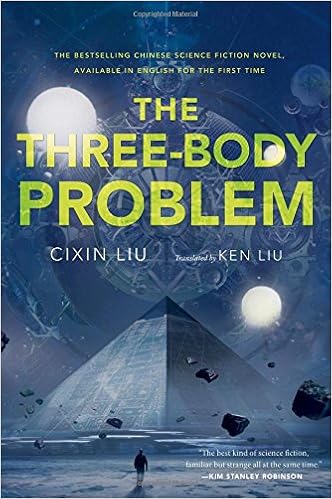 Less than a month ago, just before the Hugo Award voting deadline,
Less than a month ago, just before the Hugo Award voting deadline, 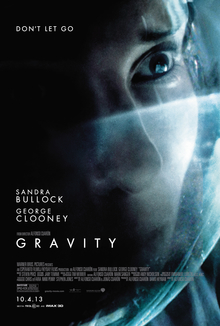 Gravity (2013)
Gravity (2013) Her (2013)
Her (2013) Interstellar (2014)
Interstellar (2014)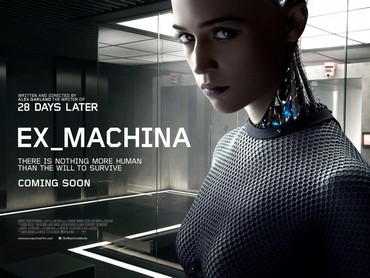 Ex Machina (2015)
Ex Machina (2015)

 Fate/stay night: Unlimited Blade Works is based on the Unlimited Blade Works storyline from the adult-rated Fate/stay night visual novel. Unlike in the US, it’s not unheard of for erotic games to be repackaged for a broader audience with the explicit scenes removed and for an anime to use the cleaned up version of the storyline.
Fate/stay night: Unlimited Blade Works is based on the Unlimited Blade Works storyline from the adult-rated Fate/stay night visual novel. Unlike in the US, it’s not unheard of for erotic games to be repackaged for a broader audience with the explicit scenes removed and for an anime to use the cleaned up version of the storyline.










